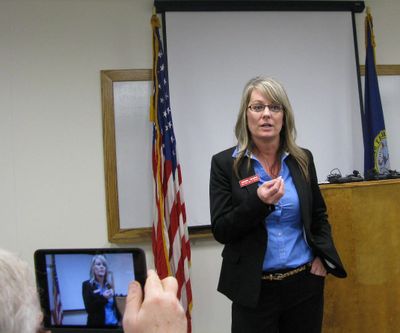Ybarra’s first Idaho school budget pitch short on details

BOISE – New state schools Superintendent Sherri Ybarra gave an unusually brief public school budget pitch to lawmakers on Thursday, calling for a 6.4 percent increase in state funding for schools next year – well under Gov. Butch Otter’s proposed 7.4 percent increase.
“I am submitting to you a budget that represents my vision for college and career readiness in Idaho education, and indicates the direction I intend to take this department over the next four years,” she told the Legislature’s joint budget committee. “I think we all agree that local control is how we can best serve Idaho’s children.”
Toward that end, Ybarra called for shifting funds from teacher professional development and other budget line items to operational funds for school districts, which districts can decide how to spend, and which covers everything from utilities to textbooks. That would raise the per-classroom operational funding next year to $24,160, still short of the 2009 level of $25,696, but well above Otter’s recommendation of $23,660.
She also called for a statutory limit on class sizes in kindergarten through third grade. “We know that 30 children in a first-grade classroom results in more crowd control and decreased overall achievement,” she told the Joint Finance-Appropriations Committee, “which does affect learning for the next 11 years, in which a child never gets that time back.” Ybarra was a third-grade teacher before becoming a district administrator and then being elected state superintendent.
However, Ybarra’s budget doesn’t include any funding for that proposal. “That is a wish list item,” she told reporters Thursday afternoon, saying she’d like to set a class-size limit around 15 to 20 students for those lower grades.
Ybarra told lawmakers she wants a “pilot project” approach to implementing a teacher career ladder pay plan, with nine school districts and one charter school to start it out next year; Otter and the state Board of Education have called for starting the first phase of the career ladder statewide next year. Still, Ybarra requested $25 million in funding next year for the plan. “I am asking for $25 million towards the career ladder — stay tuned for the details,” she said.
Lawmakers immediately asked what she’d do with that $25 million – is it just for those 10 schools next year? Ybarra said she wanted to phase the career ladder in over four years.
“The details are still being worked out on that, but it can look many different ways,” she said. “What I would like to do is build the policy around the funding. So with that, anything extra that we get could affects the way that that looks, the pilot program.”
She added, “With that, I would like to see an increase if possible to the base. … I’m just throwing numbers out there. … Maybe 2 percent each year to the base over the next four years. … But again, it’s not uncommon, I’d like to build the policy around the funding.”
Lawmakers were a bit taken aback. “I’m a little bit nervous about the budget as you talked about it,” said Sen. Roy Lacey, D-Pocatello. “You were talking about we’ll see where you fund us to see what you’re going to do. Ordinarily we have an idea of what is going to happen. So are you waiting on legislation, are you waiting on information to get us some good solid figures?”
Ybarra responded, “I’m not sure I understand what you’re asking me. Are you asking about a particular program?”
Senate Finance Chairman Dean Cameron, R-Rupert, said, “In past presentations sometimes there’s a little more detail as to what the budget will entail. But … we have the state board’s recommendation (on the career ladder), and so we’re sort of in this awkward position of trying to determine whether or not legislation will come forth and how we budget to it, and of course that’s what we’re concerned about.”
Ybarra said, “Well I just want to reiterate that I am a firm believer in local control and allowing districts to make as many decisions as they can. And this budget I did inherit, and I did show that one of the highlights basically was operational funding, and increasing that based on their needs. But some of the items could change at any time, the career ladders, depending upon how you folks fund that.”
Ybarra said she’s not opposed to the governor’s higher budget recommendation, would “absolutely” support it if that’s the direction lawmakers went.
Asked about Senate Tax Chairman Jeff Siddoway’s statements that beginning teacher pay in Idaho should be boosted to $40,000 next year, rather than over four, five or six years, Ybarra said if lawmakers allocated the money for that, “I would be out in the front just cheering that one right on.”
She said her $25 million pilot program plan on teacher pay would include a 1 percent across-the-board raise for all teachers statewide, in addition to incentive pay for the teachers in the pilot.
“At the end of the four years, we would hope to have all the bugs worked out and everybody at the table understanding it,” Ybarra said.